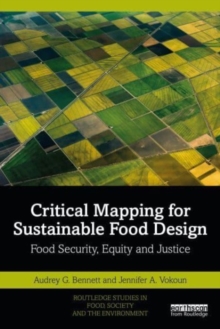Description
| Product ID: | 9781032118888 |
| Product Form: | Paperback / softback |
| Country of Manufacture: | GB |
| Series: | Routledge Studies in Food, Society and the Environment |
| Title: | Critical Mapping for Sustainable Food Design |
| Subtitle: | Food Security, Equity, and Justice |
| Authors: | Author: Audrey Grace, Jennifer A. Vokoun |
| Page Count: | 246 |
| Subjects: | Development studies, Development studies, Society and culture: general, Sociology, Economics, Agribusiness and primary industries, Manufacturing industries, Manufacturing industries, Technical design, Food and beverage technology, Alternative and renewable energy sources and technology, Environmental science, engineering and technology, Agricultural science, Health, Relationships and Personal development, Society & culture: general, Sociology, Economics, Primary industries, Manufacturing industries, Food manufacturing & related industries, Technical design, Food & beverage technology, Alternative & renewable energy sources & technology, Environmental science, engineering & technology, Agricultural science, Health & personal development |
| Description: | Select Guide Rating This book introduces critical mapping as a problem-focused design approach for analyzing systemic societal problems like food, to scope out existing solutions, and find opportunities for sustainable design intervention. This book introduces critical mapping as a problematizing, reflective approach for analyzing systemic societal problems like food, scoping out existing solutions, and finding opportunities for sustainable design intervention. This book puts forth a framework entitled "wicked solutions" that can be applied to determine issues that designers should address to make real differences in the world and yield sustainable change. The book assesses the current role of design in attaining food security in a sustainable, equitable, and just manner. Accomplishing this goal is not simple; if it was, it would not be called a wicked problem. But this book shows how a particular repertoire of design tools can be deployed to find solutions and strategize the development of novel outcomes within a complex and interconnected terrain. To address the wicked problem of food insecurity, inequity, and injustice, this book highlights 73 peer-reviewed design outcomes that epitomize sustainable food design. This includes local and regional sustainable design outcomes funded or supported by public or private institutions and local and widespread design outcomes created by citizens. In doing so, this book sets the stage for an evidence-driven and evidence-informed design future that facilitates the designers’ visualization of wicked solutions to complex social problems, such as food insecurity. Drawing on an array of case studies from across the world, from urban rooftop farms and community cookers to mobile apps and food design cards, this book provides vitally important information about existing sustainable food design outcomes in a way that is organized, accessible, and informative. This book will be of great interest to academics and professionals working in the field of design and sustainable food systems. Students interested in learning about food and sustainability from across design studies, food studies, innovation and entrepreneurship, urban studies, and global development will also find this book of great use. |
| Imprint Name: | Routledge |
| Publisher Name: | Taylor & Francis Ltd |
| Country of Publication: | GB |
| Publishing Date: | 2023-05-02 |


